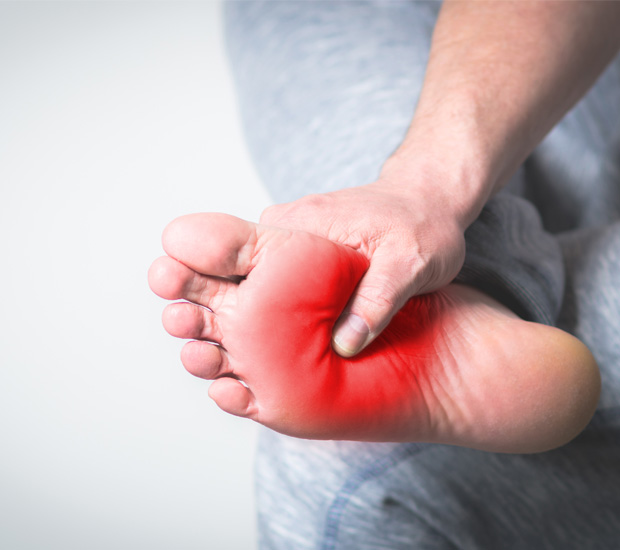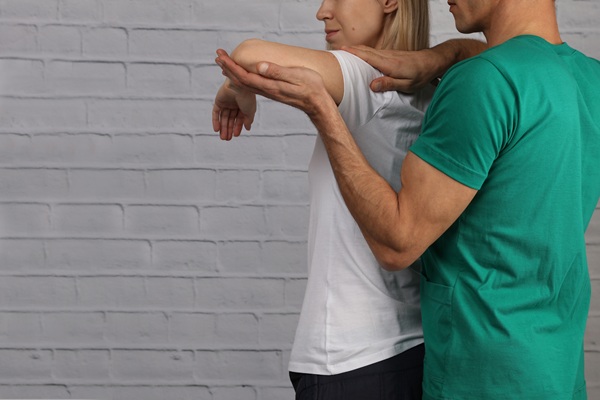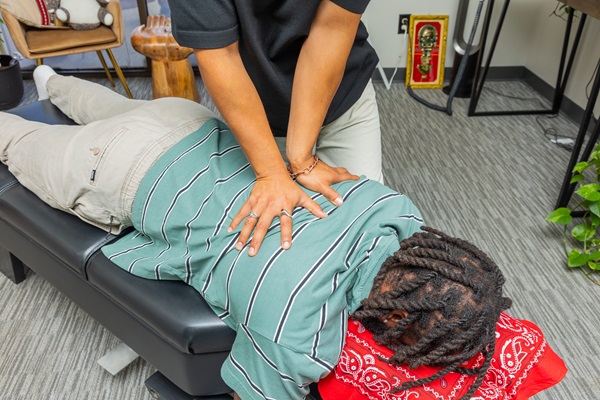Peripheral NeuropathyNapa, CA
Peripheral neuropathy is a painful condition that causes burning or tingling sensations in the hands and feet. Multiple factors can contribute to it, including diabetes, nerve injuries, and chemotherapy treatments. Living with this condition can be difficult and painful, but there are chiropractic treatments available to help manage discomfort and inflammation.
At Victory Spine Center, we offer chiropractic treatments for patients experiencing symptoms of peripheral neuropathy. Our team can help you get back to feeling like yourself. To learn more about our services or schedule an appointment, call 707-673-9509 today.
Understanding Peripheral Neuropathy
Peripheral neuropathy refers to several conditions that damage the peripheral nervous system. The peripheral nervous system acts as the communication network between the central nervous system (CNS) and other parts of the body. The nerves in this system send sensory signals to the CNS, such as a message that a person’s hands are cold. It also signals how people move, digest food, and urinate.
It is estimated that more than 20 million Americans suffer from some form of peripheral neuropathy. However, this number is likely higher, as many people with neuropathy symptoms never receive proper testing. In addition, tests do not look for all types of neuropathy, increasing the chance of a misdiagnosis since peripheral neuropathy has several similar symptoms to other conditions.
Check out what others are saying about our Peripheral Neuropathy services on Yelp: Peripheral Neuropathy Napa
Causes of Peripheral Neuropathy
Peripheral neuropathy is often caused by acquired neuropathy. This means that these types of neuropathies are acquired through environmental factors, such as toxins, trauma, illness, or infection. Acquired neuropathies may include diabetes, kidney or thyroid disease, or infections that affect the immune system, e.g., AIDS, Lyme disease, and shingles. There are also idiopathic neuropathies, which are described as nerve damage caused by an unknown source.
While not as common, neuropathy can also be hereditary. These peripheral neuropathies are typically passed from parent to child. The most common of these is Charcot-Marie-Tooth disease type 1, where symptoms of weak legs and arms appear between mid-childhood and the age of 30. It is caused by the degeneration of nerve insulation that helps them produce electrical impulses needed to trigger muscle movement.
Types and Symptoms of Peripheral Neuropathy
More than 100 types of peripheral neuropathy exist. Each type of neuropathy has its own set of symptoms and prognosis. Symptoms depend on the root cause of the damage. They also depend on which type of nerve is damaged: automatic, motor, and sensory.
- Automatic nerve damage: Symptoms include excessive sweating, heat intolerance, and inability to expand or contract small blood vessels that regulate blood pressure. While rare, some people may have difficulty eating or swallowing if esophageal nerves are damaged.
- Motor nerve damage: This type of damage is mostly associated with muscle weakness. Other symptoms may include painful cramps, muscle shrinking, and uncontrolled muscle twitching.
- Sensory nerve damage: Loss of sensations in the hands and feet is primarily caused by damage to large sensory fibers. It can lead to loss of reflex control and make it harder for people to walk or maintain their balance. Sensory nerve damage can also make people hypersensitive to touch.
In addition, there are terms that describe the extent of nerve damage: mononeuropathy and polyneuropathy. Mononeuropathy refers to damage to a single peripheral nerve, while polyneuropathy occurs when more than one peripheral nerve malfunctions simultaneously. Determining the extent of the damage can help understand the underlying problem causing the symptoms.
Mononeuropathy
It is usually caused by physical injury or trauma, such as from a car accident. Sitting for extended periods of time or continually repeating motions can also cause mononeuropathy. Carpal tunnel syndrome is a common type of mononeuropathy, as well as radial and personal nerve palsy.
Polyneuropathy
The most common symptoms include tingling, numbness, and loss of feeling in the arms and legs. Many factors can cause polyneuropathy, including exposure to toxins, poor nutrition, and complications from diseases such as cancer or kidney failure. A person with diabetes who has difficulty controlling their blood sugar is more likely to suffer from polyneuropathy. There is also Guillain-Barre syndrome, a rare disease that attacks the nerves as they leave the spinal cord; this condition’s symptoms appear quickly and worsen rapidly, sometimes leading to paralysis.
Diagnosing Peripheral Neuropathy
When a patient begins to experience symptoms of peripheral neuropathy, they should seek immediate medical attention. Early diagnosis and treatment are crucial to control symptoms and prevent future peripheral nerve damage. Their primary care provider will need their full medical history, which includes their symptoms, exposure to toxins, drinking habits, and a family history of neurological diseases.
The doctor may also check the patient’s muscle reflexes, strength, tone, and ability to feel certain sensations. In addition, they might order tests for further information. These tests may include:
- Blood tests to detect any vitamin deficiencies, diabetes, etc.
- Imaging scans (CT or MRI) to look for herniated discs, pinched nerves, etc.
- Nerve function tests, such as a sweat test or electromyography (EMG)
- Nerve or skin biopsy to look for abnormalities or nerve ending reduction
Chiropractic Treatment for Peripheral Neuropathy
While peripheral neuropathy is uncomfortable and can cause pain, there are treatment options available to help manage the symptoms. Our chiropractic care at Victory Spine Center enforces the whole-body approach to healing and bringing the peripheral system back into alignment. Rather than solely treating peripheral neuropathy pain, our specialized treatment plans treat the entire body to target and reduce the symptoms at the source.
One of the chiropractic practices that we may use to treat peripheral neuropathy includes non-surgical spinal decompression. In a non-surgical spinal decompression procedure, the patient wears a harness around their hips connected to a motorized traction table. They lie face up or down while fully clothed as the lower part of the table slides back and forth. The movements provide negative pressure to stretch and relax the nerves around the spine that may be compressed. There is no pain associated with this technique, but the patient will feel some pressure. This can also be done for the cervical spine with a modified device that stretches and relaxes the neck.
In addition, the chiropractor can advise the patient on dietary changes to reduce inflammation and improve circulation. It involves assessing their hydration level and checking for high blood pressure, diabetes, or cholesterol problems. Treatment plans may also include lifestyle modifications aimed at reducing inflammation throughout the body, such as exercise, lowering stress levels, and meditation.
Schedule a consultation today
If you are suffering symptoms of peripheral neuropathy, there is treatment available. Victory Spine Center offers chiropractic services for peripheral neuropathy and can help ease pain, weakness, or tingling sensations with a specialized treatment plan. Call our office at 707-673-9509 for more information or to schedule a consultation.
Frequently Asked Questions
What does peripheral neuropathy feel like?
The most common sensations of peripheral neuropathy can be described as pins and needles, tingling, and numbness. Discomfort can range from sharp pain to a burning and throbbing pain. These sensations occur in the part of the body affected, such as the hands and feet.
How quickly does peripheral neuropathy develop?
Some forms of peripheral neuropathy take months to years to develop. Other types can develop rapidly and continue to worsen. The symptoms and the progression of your condition vary greatly on the type of nerve(s) damaged and the underlying cause of the condition.
Can peripheral neuropathy be prevented?
While there is no sure way to fully prevent peripheral neuropathy, there are ways to minimize the risk of it by implementing healthy habits. These precautions may include taking care of your feet, decluttering the floor, and reviewing medications for side effects that may cause peripheral neuropathy. Adopting and maintaining a nutritious diet and exercise regime can also help keep your muscles strong and supply your nerves with the oxygen they need to stay healthy and functional.
Can peripheral neuropathy be stopped or reversed once I have it?
Neuropathy can sometimes be reversed if the underlying cause is treated and cured. However, the longer that a patient waits to seek treatment, the worse the nerve damage will be and may limit the ability to stop or reverse the damage. Recovery can take months or even years, while some people live with a form of neuropathy for the rest of their lives.
I think I have peripheral neuropathy. What should I do?
Patients experiencing symptoms of neuropathy should seek immediate medical attention. While the symptoms are uncomfortable, they can also be a sign of a serious disorder that needs proper treatment and diagnosis. If left untreated, peripheral neuropathy can cause permanent nerve damage.





